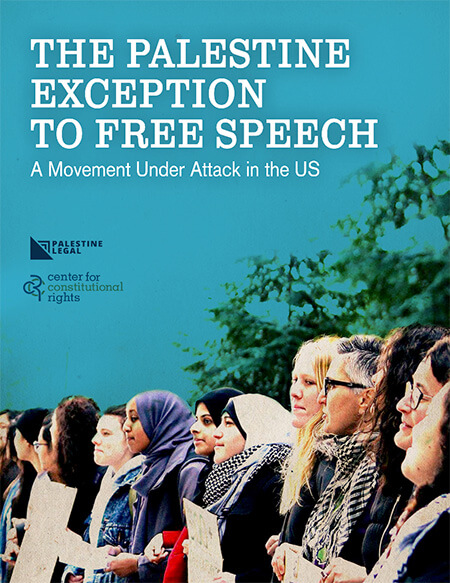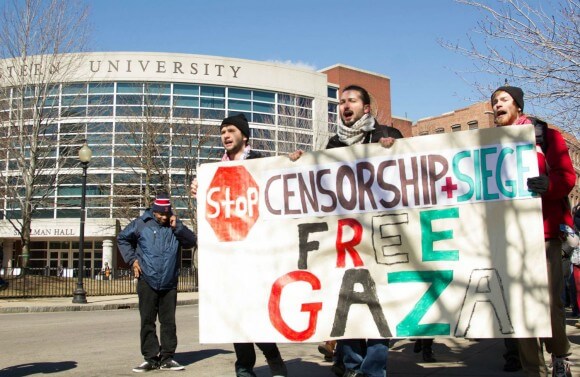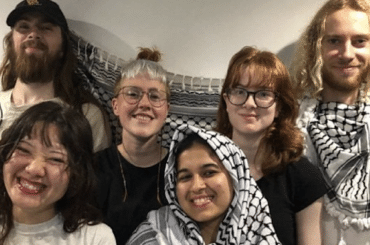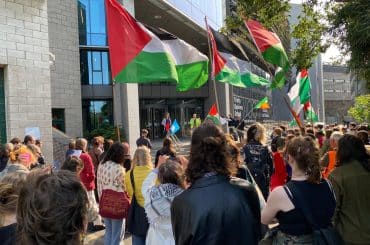The university is often imagined to be a utopian space where academic debates are freely and fiercely waged, traditional orthodoxies are challenged and marginalized opinions can be voiced without fear of personal attack.
However, a disturbing movement across US campuses has been repressing pro-Palestinian free speech, and attacks those who are peacefully advocating human rights.
Last week Steven Knapp, the president of George Washington University, issued a public statement apologising for an incident in which a student was reprimanded for hanging a Palestinian flag outside his window.
“I didn’t put up the Palestinian flag for the notion of a pro-Palestinian or anti-Israel message. I just put it up because I’m proud of my heritage”, explained 20-year old pre-med student, Ramie Abounja, whose parents were born in Palestinian refugee camps in Lebanon.
The first-generation American student said he felt “victimised and criminalised” when university police officers ordered him to remove the flag, and when he received a letter from the university threatening him with disciplinary action.
Palestine Legal
On September 30th Palestine Legal, a rights-based organisation which seeks to protect those who speak out for Palestinian freedom, published a report which highlighted the widespread attacks on Palestinian human rights advocacy in the states, particularly targeting academics and university students.

Dima Khalidi, director of Palestine Legal, spoke to Mondoweiss about the event at George Washington University, saying, “Ramie’s experience is one drop in an already full bucket. Rarely do university presidents acknowledge and pledge to rectify their university’s discriminatory treatment of those who express support for Palestine in whatever way, but we hope George Washington’s example will be followed by others.”
In the first six months of 2015 alone, Palestine Legal responded the 140 incidents and 33 requests for legal assistance, 80 percent of which concerned students and scholars.
However as the report claims, “these numbers understate the phenomenon, as many advocates who are unaware of their rights or afraid of attracting further scrutiny stay silent and do not report incidents of suppression.”
“Our report makes it ever more clear that Israel advocates are encouraging the suppression of such expression to silence the growing disquiet about the Israel/Palestine status quo”, Khalidi continued, “universities must recognize this and protect their students’ rights rather than punish their free expression.”
Suppression of academic freedom
Chapters of Students for Justice in Palestine (SJP) across the country have documented numerous bureaucratic barriers that they face, and that other societies rarely have to contend with. Student organizers of SJP have revealed that “administrative hurdles”, such as obstruction of event approvals, periodic reviews of their “disruptive influences” and extensive security fees, seem to exclusively concentrate upon Palestine activists.
However, it is not just students who are routinely singled out for their public critiques of Israel or support for Palestine, but academic staff members and institutions as well.
In a high-profile case last year Steven Salaita, a professor from the University of Illinois, was fired from his post for criticizing Israel’s assault on Gaza on Twitter, which resulted in a lawsuit in which Salaita alleged his freedom to speech was violated.
Salaita spoke to Mondoweiss about his concerns over threats to freedom of speech in relation to the Israel-Palestine crisis.
“Pro-Israel groups summon the force of institutions to stifle debate in the absence of an ability to win an actual debate”, he said, “Nobody can justify Israel’s behaviour anymore-nobody even tries. They instead try to shut down criticism altogether.”
“It’s another example of how colonization cannot function without repression”, he added.
Kristofer J. Petersen-Overton is an adjunct professor and CUNY doctoral student who was also fired in 2010 after being accused of creating a syllabus that excessively criticized Israel, but was reinstated after receiving collective support from his colleagues.
“Although I was rehired, who knows if the lesson other departments took from my cases was “let’s look a little closer at people we hire for any sign of controversial politics”, Petersen-Overton told Mondoweiss. “So a short-term victory can still have a chilling effect because universities want to avoid the sort of publicity my case caused – mostly because they handled it so poorly.”
Institutional boycott
The American Studies Association (ASA) was one of the first academic organizations to pass a boycott resolution, and has received condemnation and various legal threats over the past year. David Roediger, president of the ASA, told Mondoweiss about the opposition they have been facing.
“What has been central regarding ASA’s experience… is that our association has continued to thrive in terms of membership, finances, conference attendance, and intellectual vitality”, Roediger said.
“There were certainly wild attacks on ASA by anti-boycott groups, especially during our 2014 conference in Los Angeles. However these attacks failed, and the new round of flailing attempts to punish the speech of academic associations seems likely to do so as well.”
“After we adopted the boycott in December 2013, there were actions proposed against us by three state legislatures and the US Congress”, said Lisa Duggan, a Professor of New York University and previous president of the ASA.
“We were widely attacked in the press, and received an avalanche of hate mail. Statements criticizing our action were released by college presidents and the AAUP, but none of the legal or legislative actions were successful”.
“Public opinion has slowly turned in our direction” she added, “This record of principled action, and our capacity to hold up and even flourish under attack has helped inspire the AAA and NWSA to pass their own boycott resolutions.”
“We have to defend ourselves and say, no, we don’t actually hate Jewish people”
Alongside legal threats and bureaucratic barriers – plus other methods of suppression identified in Palestine Legal’s report such as official denunciation or even criminal investigation and prosecution – Palestinian activists also have to contend with false accusations of antisemitism or of being terrorist sympathizers.
“It is not to say anti-Semitism does not exist, but in my experience Palestinian activists… scrupulously avoid alliances with people motived on racist grounds”, Petersen-Overton said of the issue.
“After all, the Palestinian cause is – at root – an anti-racist, anti-colonial struggle. You don’t advance that cause by joining with other racists. But it’s a great way to smear people, calling them anti-Semites. That way you avoid talking about the real issues.”
HamasOnCampus.org, a website set up by students and alumni across the US, claims that “SJP was created to be Hamas on Campus and work in tandem with the Muslim Brotherhood proxy, the Muslim Students Association (MSA)”.
The assumption that Palestinian supporters are supporters of Hamas and terrorist factions not only negates the nuances of pro-Palestinian activism, but also raises grave concerns over negative Muslim stereotyping and perpetuating a misunderstanding of the Israel-Palestine crisis.
These trends in opinions in the US are especially worrying in context of Donald Trump’s calls to ban Muslims from entering the US, and Hilary Clinton’s reaffirmation of her opposition to the pro-Palestinian solidarity movement.



Thank you for the article. The report is actually on my to read list. It really shows a major disconnect in privilege/power relations when Zionists claim that it’s the Palestinian side that is censoring Zionist groups. Or as a certain “infamous” commenter here claimed, the Palestine lobby.
As for the image at top: When was this image taken? Was it during one of the many Israeli attacks on Gaza?
Otherwise I’m not too crazy when people specify “free Gaza” as if not all of Palestine is under attack and occupation and siege.
Good article. All power to Palestine Legal.
It is asserted that more instances of discrimination occur than are responded to (e.g., by Palestine Legal). If that is substantially so, then I would hope that PL might establish a way for people to (merely) report instances of anti-Palestinian discrimination which they prefer not to follow up with legal action of any kind. This would help PL see patterns of discrimination nationwide and at particular universities.
Then there are the many attacks by Israeli settlers on Palestinian children on their way to school. If that isn’t an assault on academic freedom, I don’t know what is.
Suppressing free speech in the US is but one way the Israel lobby undermines the national security interests of the American people.
I’m not sure that American students are, in general, all that concerned about freedom of speech. According to various reports I see on dodgy websites, students are more concerned with politically correct speech that does not offend anyone or make anyone feel uncomfortable.
(Not that this sort of nonsense is confined to American students. Here’s a story from Britain about the dreaded “cultural appropriation”.
http://www.independent.co.uk/student/news/university-of-east-anglia-students-union-bans-racist-mexican-sombreros-from-freshers-fair-a6671236.html
What the hell is “cultural appropriation”, anyway?
Even though I am not Japanese, I wear a traditional Japanese hakama (made in Japan, from traditional Japanese cotton and polyester) when I go onto the mats.
Is this cultural appropriation?
My wife is Japanese, but she regularly wears a garment from the Jewish cowboy culture.
Is this cultural appropriation?
Chinese play Mozart on pianos made in Korea, and Buddhist Thais celebrate St. Valentine’s Day.
Is this cultural appropriation?
“White Christmas” (yes, I know it probably should be “Multicultural Christmas with equal representation of all ethnic minorities” but that doesn’t really scan) was written by a Jew.
Is this cultural appropriation?
And if it is, why is it bad? Why can’t we mix and match our cultures?)
So if these reports are true, calls for freedom of speech on Palestine might not get the support they should. I hope that, for once, I am wrong about this.
(No Mexicans were harmed in the writing of this comment.)